Mahmoud Bukar Maina holds dual roles as junior group leader at the Biomedical Science Research and Training Centre at Yobe State University in Nigeria and in the neuroscience department at the University of Sussex in the United Kingdom. His team’s research focuses on generating induced pluripotent stem cells from Indigenous African people for open-access biobanking and investigating the molecular mechanisms of tauopathies in the context of African genetic backgrounds.
In his previous work, Maina identified a critical function of tau in the nucleolus, which sparked his ongoing research on the potential role of ancestry-driven rDNA variations in nucleolar dysfunction in tauopathies. With more than a decade of experience in initiatives to strengthen African science, he sits on multiple local and international committees and serves as a science adviser for the Yobe State Government, where he advises various institutions and funders both within and beyond Africa. He has received several recognitions, including the ALBA-FKNE Diversity Prize for the promotion of basic neuroscience and the Royal Society’s Global Talent visa.




